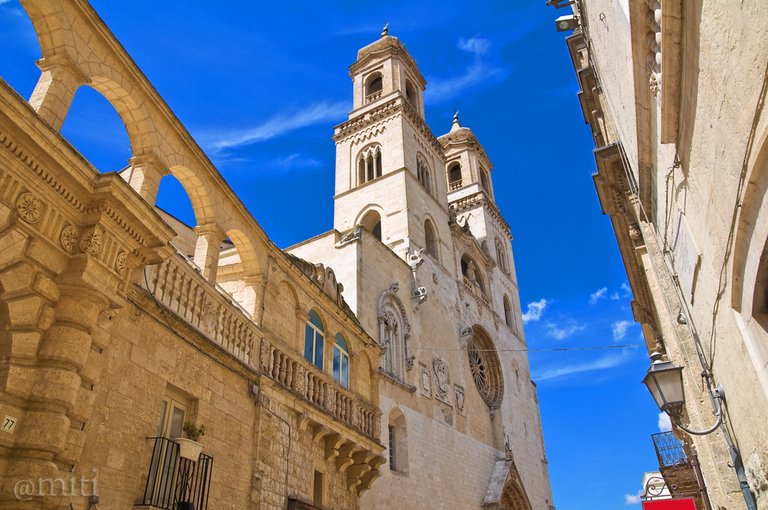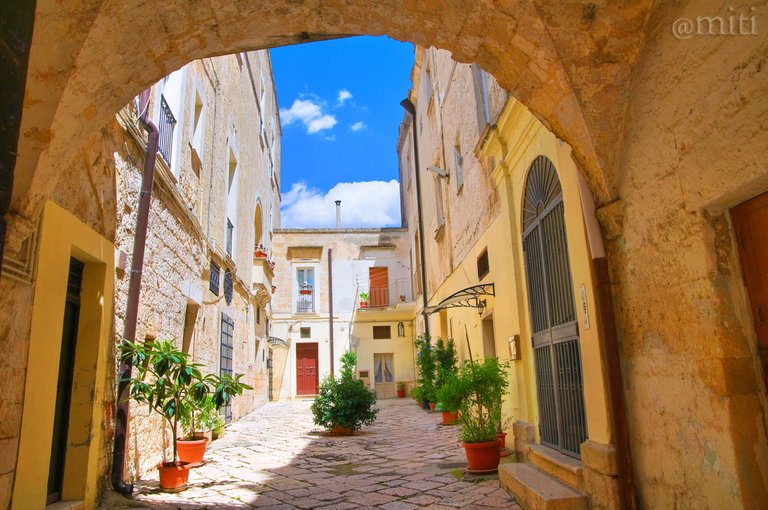
The Cathedral of Santa Maria Assunta (Author's photo - All rights reserved)
La Cattedrale di Santa Maria Assunta (Immagine dell'autore - tutti i diritti sono riservati)



Ciao a tutti,
questo è un viaggio attraverso l'Italia. Posterò una foto al giorno con una brevissima descrizione. Spero vi piaccia!

Altamura è una città nella provincia di Bari, nella regione meridionale italiana della Puglia. Situata lungo l'autostrada Bari-Matera, era la capitale degli antichi Peuceti ed è conosciuta come la "città del pane" per le sue tradizioni e la reputazione del pane che esiste da secoli.
L'area di Altamura era già popolata nell'età del bronzo, come dimostrano i ritrovamenti archeologici nell'insediamento di La Croce. Il vecchio nome era Altilia, da Alter Ilium, che significa "altra Troia", poiché secondo la leggenda fu fondato da un amico di Enea, Antellus.
Tra il VI e il III secolo aC furono erette imponenti mura cittadine (le cosiddette "mura megalitiche"), che sono ancora oggi visibili in alcune parti di Altamura.
A partire dal secolo successivo, tuttavia, la città subì un sostanziale declino, e solo nel Medioevo Altamura tornò in auge, grazie all'imperatore Federico II di Svevia (1194-1250), che ricostruì la città, ripopolando e chiamando "Altamura" per la presenza di queste imponenti mura megalitiche.
La città crebbe d'importanza sotto l'imperatore Federico II. Altamura era governata da un certo numero di famiglie feudali, come gli Orsini del Balzo e i Farnese.
Nel 1748 Carlo VII fondò un'università.
Il centro storico, situato proprio all'interno delle antiche mura, e vi si può entrare attraverso Porta Bari: è ricco di palazzi, chiese e caratteristici claustri (piccoli cortili chiusi).
La Cattedrale di Santa Maria Assunta, nel cuore della città, è un must: costruita da Federico II, è un magnifico esempio di architettura romanica pugliese e l'elegante stile gotico di Federico.
La facciata, dominata dalle sue due torri, ha un portale che risale al 14 ° secolo ed è scolpito con scene del Nuovo Testamento mentre il rosone risale al 16 ° secolo.
Ha alcune meravigliose chiese barocche come la chiesa greca di San Nicola dei Greci.
Il portale, costruito nel 1576, è scolpito con scene dell'Antico e del Nuovo Testamento, mentre l'interno contiene altari barocchi e un soffitto in legno.
Vicino Porta Matera si trova la Chiesa di Santa Maria del Soccorso, oggi chiamata "San Francesco di Paola" (risalente al XVI-XVIII secolo), annessa al monastero che fu ampliato nel 1872.
Interessanti anche la chiesa e il convento cinquecentesco di San Domenico (l'interno della chiesa presenta dipinti e altari marmorei e un pavimento piastrellato risalente alla metà del XVIII secolo) e il monastero seicentesco e la chiesa di Santa Chiara che ora ospita una comunità di suore.
Appena fuori città, il Santuario della Madonna del Buon Cammino è un altro posto da visitare.
Nella campagna fuori da Altamura, nel Parco Nazionale dell'Alta Murgia, si trova il famoso "Pulo", una notevole dolina carsica di circa 100 metri di profondità.
Nella zona sono stati trovati molti fossili eccezionali, tra cui l'uomo di Altamura, i resti unici di uno scheletro umano completo risalente al periodo paleolitico e 30.000 tracce di dinosauri nel quartiere di Pontrelli.
Cosa vedere: il Centro storico, la Cattedrale di Santa Maria Assunta, la Chiesa di San Nicola dei Greci, la Chiesa di San Francesco di Paola, la Chiesa e il Convento di San Domenico, la Chiesa di Santa Chiara , il Santuario della Madonna del Buon Cammino, il Parco Nazionale dell'Alta Murgia, il Pulo di Altamura, la Chiesa di Sant'Agostino, il Palazzo De Angelis-Viti, i Claustri.

Hello everyone,
I began a Photo Journey through Italy. I will post one photo every day with a little note of explanation. I hope you like it!

Altamura is a city in the province of Bari, in the southern Italian region of Puglia. Situated along the Bari-Matera highway, it was the Capital of the ancient Peucetii and it's known as the 'city of bread' for its bread making traditions and reputation which has existed for centuries.
The area of Altamura was already populated in the Bronze Age as shown by archeological findings in La Croce settlement. The old name was Altilia, from Alter Ilium, meaning "other Troy", since according to the legend it was founded by a friend of Aeneas, Antellus.
Between the 6th and 3rd century BC imposing city walls (the so-called “megalithic walls”) were erected, which are still visible today in some parts of Altamura.
From the following century however, the city experienced a substantial decline, and it was only in the Middle Ages that Altamura regained some importance, thanks to Emperor Frederick II of Swabia (1194-1250), who re-made the city, repopulating and calling it "Altamura" because of the presence of these high megalithic walls.
The city grew in importance under Emperor Frederick II. Altamura was ruled by a number of feudal families, such as the Orsini del Balzo and the Farnese. In 1748 Charles VII established a University.
The historic centre, located just inside the ancient walls, can be entered through Porta Bari: it is full of palaces, churches, and characteristic claustri (small, closed courtyards).
The Cathedral of Santa Maria Assunta, in the heart of the town, is a must-see.: built by Frederick II, it's a magnificent example of Puglia’s Romanesque architecture and Frederick’s elegant Gothic style. The facade, dominated by its two towers, has a portal that dates from the 14th century, and is carved with scenes from the New Testament while the rose window dates from the 16th century.
It has some wonderful Baroque church like the Greek Church of San Nicola dei Greci. The portal, built in 1576, is carved with scenes from the Old and New Testaments, while the interior contains Baroque altars and a wood ceiling. At the Porta Matera there's the Church of Saint Maria del Soccorso, today called “San Francesco di Paola” (dating from the 16th -18th century), annexed to the monastery that was expanded in 1872.
Also of interest are the 16th century church and convent of San Domenico (the interior of the Church has paintings and marble altars and a tiled floor from the mid-18th century) and the 17th century monastery and Church of Santa Chiara which now gives hospitality to a community of nuns.
Just outside the town, the Sanctuary of the Madonna del Buon Cammino is another highlight.
In the countryside outside Altamura, in the Alta Murgia National Park, you'll find the famous “Pulo,” a remarkable karst sinkhole roughly 100 meters (c. 300 feet) deep. Many exceptional fossils have been found in the area, including Altamura Man, the unique remains of a complete human skeleton dating to the Palaeolithic period, and 30,000 dinosaur tracks in the Pontrelli neighbourhood.
Thing to see: the Historical centre, the Cathedral of Santa Maria Assunta, the Church of San Nicola dei Greci, the Church of San Francesco di Paola, the Church and Convent of San Domenico, the Church of Santa Chiara, the Sanctuary of the Madonna del Buon Cammino, the Alta Murgia National Park, the Pulo of Altamura, the Church of Sant'Agostino, the De Angelis-Viti Palace, the Claustri.

| Tipo di foto / Category | Paesaggio / Landscape view |
| Esposizione / Settings | 1/320 sec, ISO 200, f/10 |
| Camera | Nikon D5000 |
| Lente / Lens | Tamron SP 17-50mm f/2.8 XR Di II LD |
| Filtro / Filter | Polarizzatore Hoya / Hoya Polarizing filter |
| Cavalletto / Tripod | Manfrotto MKC3-P01 |
| Località / Location | Altamura (Bari), Italia |
| Software | Photoshop |


Alleyway in the historical centre (Author's photo - All rights reserved)
Vicolo nel centro storico (Immagine dell'autore - tutti i diritti sono riservati)
incredible italy
Italy is amazing
Posted using Partiko Android
Yes, it really is!
Italy looking ass journey place for all our foreigners i thinks too coming on this awesome place
Great Post With Great Information.
My 100 % upvote for this post.
Thank you ;-)
Posti sempre delle bellissime foto, complimenti!
Grazie mille!
Both photos are beautiful and the text going with them is great and very informative.
Hi @rynow! Thank you for your kind words!
Excellent photography my dear friend miti.Good job. Love your post..
nice
You are a great photographer because I like your photo collection
Thank you.
nice click ...with helpful information ...how long you have been clicking photos???
Thanks.. I'm a photographer for over 10 years
Lovely photos! They're amazing
Thanks
Thank you very much for giving us such a beautiful view.Beautiful photography.Thank you.
You're welcome!
valo thakte dao
Posted using Partiko Android
Beatiful place!!
Yes, it is!
Love the helpful info and beautiful pic
I'm glad you like this format!
Nice!
Anche questo luogo é incantevole!!!
Ciao Carol, si... Merita sicuramente una gita!
Lol, it seems as really many steemians are at italy these days. It's the 4th post i read about. But well, it's a nice country. Wish you a great trip!
I'm Italian :D
Que hermoso ojalá algún día pueda visitar Italia 🇮🇹
Spero che un giorno tu possa riuscirci.
You got a 53.95% upvote from @ocdb courtesy of @miti!
I find this picture really relaxing.
I love that photo of the archway, nice job.
Thanks!
Check out my profile guy you’ll be impressed( if you upvote me , i upvote you too)
Your comment is considered SPAM... Take a look in this guide:
https://steemit.com/steemit/@miti/a-complete-guide-for-newcomers-and-minnows-to-avoid-a-possible-spam-and-to-write-good-comments
It will help you.
The best part of beauty is that which no picture can express
Your comment is considered SPAM... Take a look in this guide:
https://steemit.com/steemit/@miti/a-complete-guide-for-newcomers-and-minnows-to-avoid-a-possible-spam-and-to-write-good-comments
It will help you.